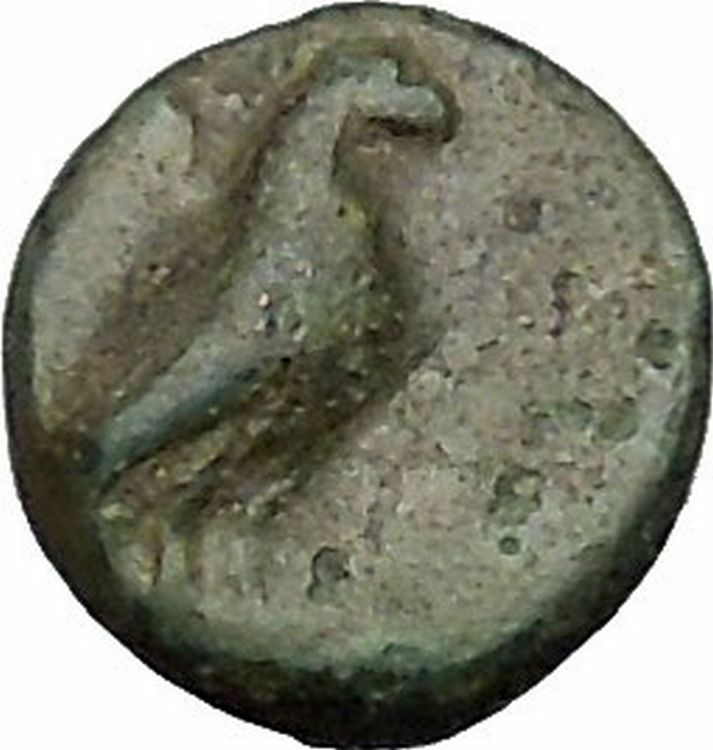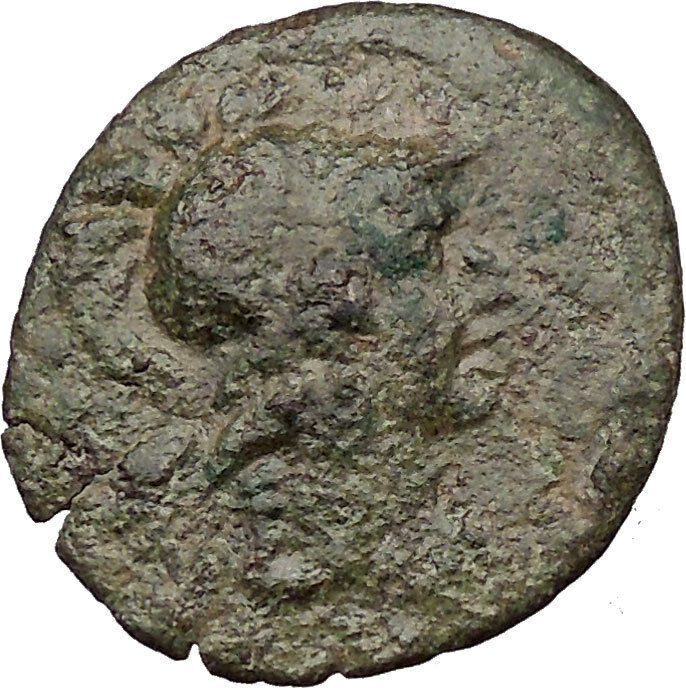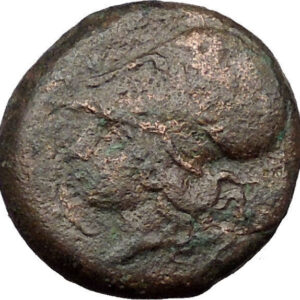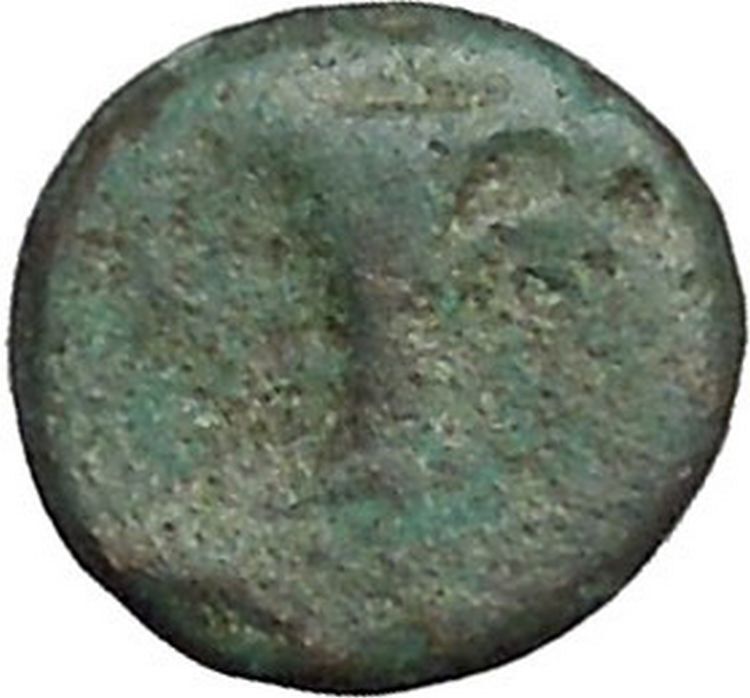|
Greek Coin of
Seleukid Kingdom
Alexander I Balas – King:
152-145 B.C.
Bronze 20mm (6.53 grams) Apameia on the Axios mint
Reference: HGC 9, 901 (R1-2); SC 1795 and 1805
Head of Alexander I Balas in lion skin headdress.
ΒΑΣΙΛΕΩΣ ΑΛΕΞΑΝΔΡΟΥ
either side of Apollo standing left, holding arrow and grounded bow; palm frond
to outer left, monogram in exergue.
Claiming to be a son of Antiochus
IV, Alexander Balas swept to power in Syria in 150 B.C. with the support of
Attalos of Pergamon and Ptolemy of Egypt. However, his dissolute life-style soon
made him unpopular, and he was overthrown after a reign of only five years.
You are bidding on the exact item pictured,
provided with a Certificate of Authenticity and Lifetime Guarantee of
Authenticity.

In
Greek
and
Roman mythology
,
Apollo,
is one of the most important and diverse of the
Olympian deities
. The ideal of the
kouros
(a beardless youth), Apollo has been
variously recognized as a god of light and the sun; truth and prophecy;
archery
; medicine and healing; music, poetry,
and the arts; and more. Apollo is the son of
Zeus and Leto
, and has a
twin
sister, the chaste huntress
Artemis
. Apollo is known in Greek-influenced
Etruscan mythology
as Apulu. Apollo was
worshiped in both
ancient Greek
and
Roman religion
, as well as in the modern
Greco
–Roman
Neopaganism
.
As the patron of Delphi
(Pythian Apollo), Apollo was an
oracular
god — the prophetic deity of the
Delphic Oracle
. Medicine and healing were
associated with Apollo, whether through the god himself or mediated through his
son Asclepius
, yet Apollo was also seen as a god
who could bring ill-health and deadly
plague
as well as one who had the ability to
cure. Amongst the god’s custodial charges, Apollo became associated with
dominion over
colonists
, and as the patron defender of herds
and flocks. As the leader of the
Muses (Apollon Musagetes) and director of their choir, Apollo
functioned as the patron god of music and
poetry
.
Hermes
created the
lyre for him, and the instrument became a common
attribute
of Apollo. Hymns sung to Apollo were
called paeans
.
In Hellenistic times, especially during the third century BCE, as Apollo
Helios he became identified among Greeks with
Helios
,
god of the sun
, and his sister Artemis
similarly equated with
Selene
,
goddess of the moon
. In Latin texts, on the
other hand, Joseph Fontenrose declared himself unable to find any conflation of
Apollo with
Sol
among the
Augustan poets
of the first century, not even
in the conjurations of
Aeneas
and
Latinus
in
Aeneid
XII (161–215). Apollo and Helios/Sol
remained separate beings in literary and mythological texts until the third
century CE.
Alexander Balas (Greek
Ἀλέξανδρoς Bάλας), ruler of the
Greek
Seleucid kingdom
150-146 BC, was a native of
Smyrna
of humble
origin, but gave himself out to be the son of
Antiochus IV Epiphanes
and heir to the Seleucid throne. Along with his
sister Laodice, the youngster Alexander was “discovered” by Heracleides, a
former minister of Antiochus IV and brother of
Timarchus
,
an usurper in Media
who had been executed by the reigning king
Demetrius I Soter
.
Alexander’s claims were recognized by the
Roman
Senate
,
Ptolemy Philometor of Egypt
and others. He married
Cleopatra Thea
, a daughter of the
Ptolemaic dynasty
. At first unsuccessful, Alexander finally defeated
Demetrius Soter in 150 BC. Being now master of the empire, he is said to have
abandoned himself to a life of debauchery. Whatever the truth behind this, the
young king was forced to depend heavily on his Ptolemaic support and even struck
portraits with the characteristic features of king
Ptolemy I
.
Demetrius Soter’s son
Demetrius II
profited by the opportunity to regain the throne. Ptolemy
Philometor, who was Alexander’s father-in-law, went over to his side, and
Alexander was defeated in the
battle of Antioch (145 BC)
in Syria, sometimes known as the battle of the
Oenoparus.
He fled for refuge to a
Nabataean
prince, who murdered him and sent his head to Ptolemy Philometor,
who had been mortally wounded in the engagement.
Seleucid
Empire
Σελεύκεια
Seleúkeia |

|
312 BC–63 BC |
↓
|
|
|
The Seleucid Empire in 301 BC.
|
The Seleucid Empire
was a
Hellenistic
state ruled by the Seleucid dynasty
founded by
Seleucus I Nicator
following the division of
the empire created by
Alexander the Great
. Seleucus received
Babylonia
and, from there, expanded his
dominions to include much of Alexander’s
near eastern
territories. At the height of its
power, it included central
Anatolia
, the
Levant
,
Mesopotamia
,
Kuwait
,
Persia
,
Afghanistan
,
Turkmenistan
, and northwest parts of
India
.
The Seleucid Empire was a major center of
Hellenistic
culture that maintained the
preeminence of
Greek
customs where a Greek-Macedonian
political elite dominated, mostly in the urban areas. The Greek population of
the cities who formed the dominant elite were reinforced by emigration from
Greece
. Seleucid expansion into
Anatolia
and Greece was abruptly halted after
decisive defeats
at the hands of the
Roman army
. Their attempts to defeat their old
enemy
Ptolemaic Egypt
were frustrated by Roman
demands. Much of the eastern part of the empire was conquered by the
Parthians
under
Mithridates I of Parthia
in the mid-2nd century
BC, yet the Seleucid kings continued to rule a
rump state
from
the Seleukid Kingdom
until the invasion by
Armenian
king
Tigranes the Great
and their ultimate overthrow
by the Roman
general
Pompey
.
|










